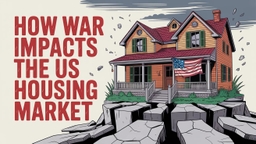Written by: Sanjin Hadziomerovic
With President Donald Trump back in office and already enacting sweeping economic and immigration measures, U.S. real estate investors—particularly short-term rental (STR) operators—are experiencing direct market impacts. In early March 2025, Trump implemented wide-ranging tariffs on imports from Canada, Mexico, and China and launched a crackdown on undocumented immigration. These policies have begun reshaping construction costs, housing supply, and the viability of real estate investments in key markets.
This article synthesizes insights from trusted outlets like The Wall Street Journal, Barron’s, Reuters, and CBRE, combined with STR-specific analysis for real estate investors using data from Chalet Market Insights.
Tariffs: Increased Costs on Core Real Estate Materials
As of March 4, 2025, the Trump administration imposed the following tariffs:
- 25% on all imports from Canada and Mexico, excluding energy (10%)
- 10% on all Chinese imports
- A 30-day delay was granted for USMCA-compliant goods, pausing some tariffs until April 2, 2025.
These trade actions have already driven up costs across the supply chain—particularly for goods directly affecting the real estate and construction industries.
🔨 Key Goods Impacted by Tariffs
| Goods | Use in Real Estate | Impact on STR Investors |
| Lumber (Canada) | Framing, flooring, roofing, cabinetry | Increases cost of renovations and rehab projects |
| Steel & Iron | Rebar, structural beams, fasteners, nails, screws | Inflates costs of construction, HVAC, and structural work |
| Aluminum | Windows, doors, siding, wiring, ductwork | Higher prices for appliances and energy systems |
| Appliances/Electronics | Fridges, stoves, washers, smart tech (from China/Mexico) | Costlier property setups, especially for full STR furnishings |
| Hardware & Fixtures | Faucets, lighting, locks, hinges | Budget overruns for cosmetic upgrades and replacements |
| Furniture | Beds, sofas, decor—especially imported from Asia | Staging an STR property becomes significantly more expensive |
According to the The Wall Street Journal, the National Association of Home Builders (NAHB) estimates that tariffs on Canadian lumber alone add $7,500 to $10,000 to the cost of a typical new home. For STR investors—who often purchase fixer-uppers and renovate them into guest-ready units—this inflation directly cuts into ROI.
Markets like Tampa, Phoenix, and Orlando—where demand is strong and construction is active—are especially vulnerable. View renovation feasibility and gross yield data on Chalet Market Insights.
Labor Shortages from Deportation Policy
Trump’s immigration policy focuses heavily on mass deportations, which are already reducing the availability of construction labor. According to Fast Company, builders report major struggles in sourcing subcontractors and tradespeople due to fear of enforcement or deportation actions. The result? Project delays, higher labor bids, and lower housing output.
This isn’t just a big builder problem—STR investors are feeling it too:
- Renovations take longer → missed peak tourist seasons
- Cleaning and maintenance services thin out → harder to deliver a 5-star guest experience
- Less housing supply → prices rise faster in investor hotspots
As Bankrate notes, these labor shortages also affect ongoing STR operations, with rising costs for essential services like lawn care, repairs, and turnover cleaning.







